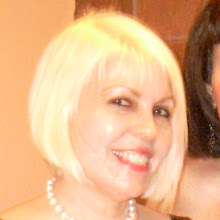
Writing prompt: Barbara Creed describes the use of the "abject" maternal body in Cronenberg's film, The Brood. Beyond the examples she cites, have you seen other films that use the female body or womb imagery in similar "abject" ways?
The film that comes to mind in comparison to Cronenberg’s The Brood, is Roman Polanski’s Rosemary’s Baby. I think that Polanski does it much more successfully, however.
Nola was influenced by Dr. Raglan’s book, The Shape of Rage. She was perhaps convinced by him to give form to her anger in the end result of producing a monstrous brood, but it is ultimately her decision to create the brood and in the end, she is the one who controls who will be the victims of her little monsters. In the shocking scene in which we look under her cloak to see the bloody sac she rips open with her teeth, we watch her lovingly lick the blood off of her creation, thus showing her maternal love.
Rosemary’s body is used in the worst way possible, to give birth to the son of Satan, and it is definitely not her choice. Rosemary’s Baby has the shocking final scene in which Rosemary forces her way into the adjoining apartment by the use of a knife and insists upon looking at her stolen child. She exclaims, “His eyes, what have you done to his eyes.” We see the horror on her face. Polanski wisely refuses to show the actual child’s eyes, knowing that anything the audience can imagine is much worse and more personally terrifying than anything that could be portrayed on the screen. In the end, Rosemary’s maternal instincts get the better of her, and she can’t help but want to become a mother to the little tyke.
In The Artist as Monster, the Cinema of David Cronenberg, William Beard states, “… in the scene at the end of the film where she gives birth to one of them (the children of her rage), the film finally enters completely into the world of the visceral transgressive body – and returns also to the theme of the power and horror of the abject female body.”
Nola has, on purpose, created little monsters to do her bidding. She has reverted to an animal-like state that causes her body to break all of the rules of nature and create it’s own monsters. Rosemary has unknowingly created a child of Satan. At the end of both films we see what the female body is capable of producing.
The men in the films react differently. In Rosemary’s Baby, Rosemary’s husband, Guy is the one who sells his soul to the devil, or more accurately sells Rosemary’s womb to the devil, in return for fame, fortune and a comfortable life.
In The Brood, Nola’s husband, Frank, is a passive bystander. His only desire is to protect his daughter, Candace, from the monster he fears his wife has become. In the end he isn’t able to protect her. We have some sympathy for Frank because the woman he married turned into a psycho, yet we grow impatient with his continual ineffectual behavior. When Juliana (Nola’s mother) is murdered by an unseen monster, Frank assures Candace that the monster is gone and she’s perfectly safe. Yet we as the audience realize that he’s being naïve in this assumption.
As far as the filmmaking goes, Roman Polanski’s interpretation of Ira Levin’s Rosemary’s Baby is timeless. We see that it’s clearly a period piece from the 60’s, but the horror we experience through Rosemary’s limited viewpoint is raw and real.
Chronenberg’s rendition of The Brood has a dated look and feel to it. Much of the acting and dialogue is melodramatic and screams 70’s but in a bad way. We’re never drawn into that world.
Both films confirm my belief that there’s nothing worse than a weird kid.
Works Cited:
The Brood by David Cronenberg
Rosemary’s Baby by Roman Polanski
The Artist as Monster, the Cinema of David Cronenberg by William Beard

Sally, interesting post! I had to think back to what I found most horrifying about Rosemary's Baby, and I believe (besides the rape scene) it was the complete sense of helplessness. By the time she realized something was wrong, she had nowhere to turn. Even her doctor was in on the secret. Nola was definitely in total control the entire time. She chose to go through this "strange adventure." I think the thing I found most horrifying about The Brood was that I had to chant "it's strawberry jelly, strawberry jelly" when Nola's licking her baby. *urp*
ReplyDeleteYour last line made me laugh. :D
Great juxtaposition of "birth" films! (Have you ever seen "It's Alive"?) Maternal instincts are pretty primal, these stories seem to tell us...and yet, because they are more primal than civilized, they are demonized or reduced to monstrosity. Rosemary's Baby seems a bit less about the abject primal womb than Brood, but you raise a lot of good points here.
ReplyDeleteI haven't seen that new movie, THE ORPHAN, but I seriously want to. For some reason, your post reminded me of it.